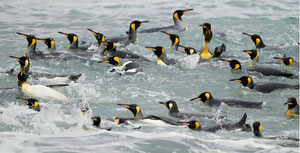
Besides asking friends, there are lots of sources of help for developing writers. You can read books, look online, or even pay a consultancy.


The Writers and Artists' Yearbook contains some useful advice from masters of the different genres, and is a very handy bible for the beginner. It is also a very useful resource when you are ready to look for a publisher.
Fortunately, a few of the giants in the business have published their own advice to help us follow in their footsteps.
My own favourite is On Writing by Stephen King, because it's inspiring as well as practical.

I'm biased, but I'd thoroughly recommend the ‘Free Advice' sections on The Writers' Workshop website. Even when I'd really finished my first book, I still read all through these as a kind of ‘final checklist'. This is also the place to go if you want to check basic things like desirable word count or how to approach an agent.

Joining any kind of writers' group is helpful, but you can also find good company online. My favourite forum is the Absolute Write Water Cooler, where I sometimes post myself.
It's predominantly American, but there are British writers posting there too, and most of the subjects under discussion are of global relevance. There is also a good ‘Share Your Work' forum where you can get members to give you a free critique of your work - and since a number of them are already published authors, some of the advice is very good indeed.
A more serious and literary approach can be found at The Word Cloud, which is also more British in tone, but the competitions are
excellent, and there's some very thought-provoking discussion.
Another British one is writewords, which also has some very valuable discussion, but it seems less active than the others, and there is
also a small fee to join.

This worked for me, but they can be very expensive and are not for everyone. I only used one because I was 100% sure I'd got as polished a book as I could get on my own, and had enough faith in it to consider the outlay a worthwhile investment. In most cases, finding a good 'beta reader' (or several) to check your work and give helpful (and critical) notes may be as much as you need. It is certainly not a REQUIREMENT to have your work 'professionally edited' before you submit, and I would be very wary of any company that suggests it is. There are an alarming number of scam operations in the consultancy business, and I'd always recommend checking them out thoroughly before you try one.
Obviously I used and would wholeheartedly recommend The Writers' Workshop but The Literary Consultancy is also highly spoken of in the industry. The oldest and most famous is probably Cornerstones, but it's worth noting that in addition to their fee Cornerstones will demand 10% of your initial advance if they secure a deal.
Finding a publisher
My own experience is obviously limited to the single route, but good advice can be found (again) in both the Writers and Artists' Yearbook, and also at the Writers' Workshop.
I recommend this booklet by Ken Umbach on the different ways into to publishing. Ken gives a lot of time helping new writers over at AbsoluteWrite, and is very happy for people to download this pdf free for personal use. It's aimed at an American readership but the principles are still broadly similar.

The best online field guides for spotting the villains are at Preditors and Editors and the Writer Beware site.
If you come across someone you'd like to check out who isn't featured on either of these, then AbsoluteWrite runs a special forum for Bewares and Background checks.
If the company still isn't listed, you can always post a question about it yourself. It could save you a lot of money – and the future of your book.
